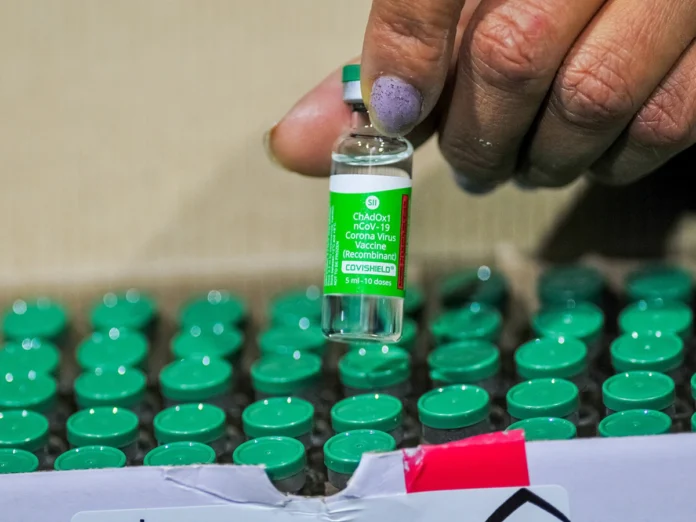Indian studies have indicated that the benefits of Covishield, the Oxford-AstraZeneca COVID-19 vaccine manufactured by the Serum Institute of India, outweigh the risk of side effects. This optimistic assessment comes in light of concerns surrounding a rare blood clotting side effect known as Thrombosis with Thrombocytopenia Syndrome (TTS).
Recent research conducted in India has highlighted the efficacy and safety of Covishield in preventing severe illness and reducing the risk of hospitalization and death due to COVID-19. These findings have provided reassurance to both healthcare professionals and the public regarding the vaccine’s overall effectiveness in combating the ongoing pandemic.
Despite these positive findings, concerns about the rare side effect of TTS have persisted. TTS is characterized by blood clot formation in combination with low levels of platelets, which can potentially lead to serious health complications. While the incidence of TTS following Covishield vaccination remains extremely low, the potential risk associated with this side effect has raised questions about vaccine safety and efficacy.
Health authorities and regulatory agencies have been closely monitoring reports of TTS and have implemented measures to mitigate the risk. This includes raising awareness among healthcare providers and the public about the signs and symptoms of TTS, as well as providing guidance on appropriate management and treatment protocols.
In light of the available evidence, experts emphasize the importance of weighing the benefits and risks of vaccination on an individual basis. While the risk of TTS is extremely rare, individuals with a history of blood clotting disorders or other underlying health conditions may need to consult with their healthcare provider before receiving the Covishield vaccine.
It is essential to maintain open and transparent communication about vaccine safety and efficacy to address any concerns or misconceptions among the public. By providing accurate information and guidance, health authorities can help individuals make informed decisions about vaccination and contribute to the overall success of vaccination campaigns in controlling the spread of COVID-19.
As the global vaccination effort continues, ongoing research and surveillance are crucial for identifying and addressing any potential safety concerns associated with COVID-19 vaccines. While the benefits of vaccination in preventing severe illness and reducing transmission remain clear, ongoing vigilance and collaboration are essential to ensure the continued success of vaccination programs worldwide.
One of the key findings from Indian studies is the high level of effectiveness demonstrated by Covishield in preventing severe illness and hospitalization due to COVID-19. Real-world data from India has shown that the vaccine provides robust protection against the virus, with a significant reduction in the risk of severe outcomes among vaccinated individuals.
Furthermore, Covishield has been instrumental in driving India’s vaccination campaign, which is one of the largest and most ambitious immunization efforts in history. The widespread deployment of Covishield across the country has played a crucial role in reaching vulnerable populations and achieving high levels of vaccine coverage, thereby contributing to the overall control of the pandemic.
However, despite Covishield’s overall positive profile, concerns about rare side effects such as TTS have emerged as a point of contention. While the incidence of TTS following Covishield vaccination is extremely low, it is important to address these concerns and provide reassurance to the public about vaccine safety.
Health authorities and regulatory agencies have taken proactive measures to monitor and manage the risk of TTS associated with Covishield. This includes implementing enhanced surveillance systems to detect and investigate any cases of TTS, as well as providing guidance on the management and treatment of this rare side effect.
In addition to TTS, other potential side effects associated with Covishield, such as mild to moderate reactions at the injection site or flu-like symptoms, have been reported. However, these side effects are generally short-lived and resolve on their own within a few days. The benefits of vaccination in preventing COVID-19 far outweigh the risks of these temporary side effects.
It is also important to recognize the evolving nature of vaccine safety monitoring and the need for ongoing research to assess any long-term effects of Covishield. Continued surveillance and data collection will help to further refine our understanding of the vaccine’s safety profile and identify any potential rare or unexpected adverse events.
Overall, the evidence from Indian studies suggests that Covishield remains a highly effective and safe vaccine for preventing COVID-19. While concerns about rare side effects such as TTS should not be ignored, they should be viewed in the context of the vaccine’s overall benefits in controlling the pandemic and saving lives.
As India and the rest of the world continue to navigate the challenges posed by COVID-19, Covishield and other vaccines will play a crucial role in bringing an end to the pandemic. By maintaining trust in the scientific evidence and prioritizing vaccination efforts, we can work together to overcome this global health crisis and build a safer and healthier future for all.

